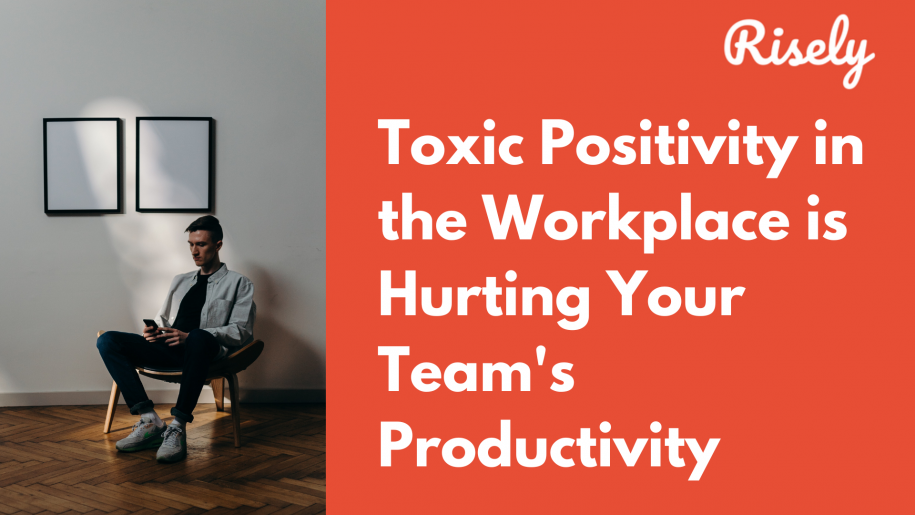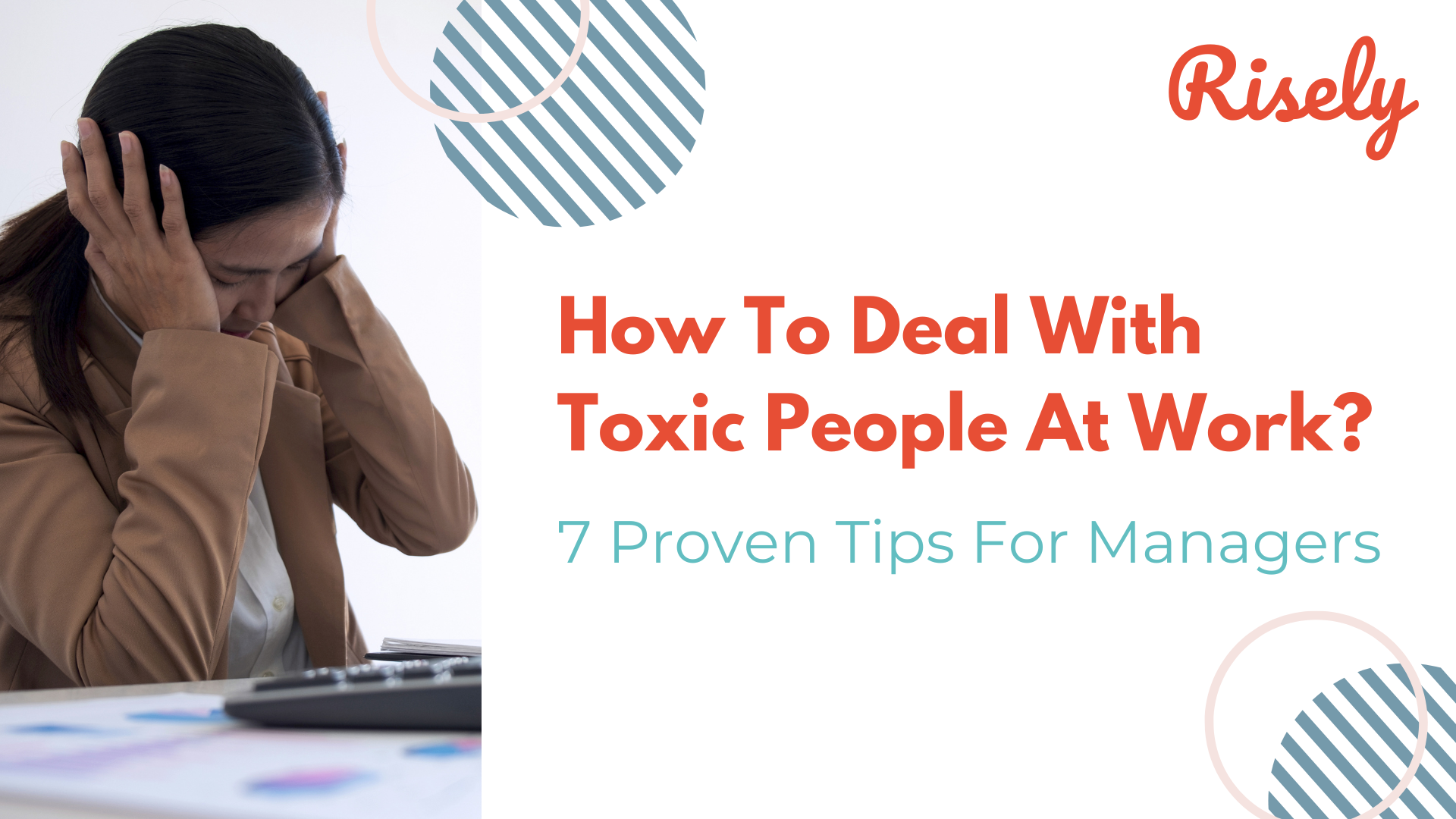Toxic Positivity in the Workplace is Hurting Your Team’s Productivity
Are you tired of always hearing “just stay positive” or “look on the bright side”? While positivity can be a great attitude, it can do more harm than good when it becomes toxic. Toxic positivity is the belief that one should always maintain a positive mindset, even when faced with difficult situations. Unfortunately, it dismisses and invalidates real emotions and can lead to unrealistic expectations. In the workplace, toxic positivity can cause burnout, decreased productivity, and low morale. This blog post will discuss toxic positivity at work and how it manifests in the workplace. We will also provide tips on preventing it from turning toxic and creating a healthy work environment where open communication is encouraged while balancing optimism and realism.What is toxic positivity?
Toxic positivity is the harmful notion that one must always maintain a positive outlook, regardless of the situation. The belief emphasizes that one should only focus on positive emotions and experiences while ignoring or suppressing negative emotions. It can cause negative feelings for those experiencing challenging emotions, leading to a lack of empathy and understanding in the workplace. While positivity can be beneficial in some situations, toxic positivity at work can be harmful, preventing people from acknowledging and processing their genuine emotions. Is your workplace culture becoming toxic? Read more to find out: Toxic Workplace Culture – 10 Critical Signs and Solutions for ManagersExamples to identify toxic positivity in the workplace
The culture of avoidance around negative emotions at work is called toxic positivity. It pressures employees into always being upbeat and avoiding complicated feelings like sadness or stress. Toxic positivity ignores genuine concerns and creates an unrealistic expectation always to feel positive. So what does this look like? Let’s understand through some illustrations:- During a team meeting, Sarah expresses her concerns about the workload and its impact on her well-being. Her colleague, Mike, responds with toxic positivity, saying, “Just stay positive and everything will work out fine. Don’t dwell on the negative, it’s all about having a positive mindset.” Sarah feels invalidated and unheard, as her legitimate concerns are brushed off without practical solutions or empathy.
- After a project fails to meet the desired outcome, Mark, the team leader, addresses the team by saying, “Let’s focus on the bright side and see this as a learning opportunity. We shouldn’t dwell on the past or our mistakes.” Instead, the team members felt dismissed, as they were expecting a sincere acknowledgment of their efforts and a constructive discussion on how to improve future projects.
- A team member, Sara, expresses her frustration about a colleague who consistently takes credit for her ideas. Her manager, Chris, responds with toxic positivity: “Just let it go and keep spreading positivity. Don’t let it affect your mood or productivity.” As a result, Sara feels unsupported, as her manager fails to address the issue and instead expects her to suppress her emotions and carry on without resolution.
Other Interesting Reads
Why does toxic positivity exist?
There’s no single reason to blame for toxic positivity at work, as it can rise for various reasons. Toxic positivity can arise from the societal expectation always to display happiness and positivity. It may also be used as a coping mechanism for negative emotions or promoted in workplaces to avoid addressing more profound issues. A lack of emotional intelligence and empathy can also contribute to toxic positivity. Moreover, a lack of accountability or unwillingness to resolve issues can also cause toxic positivity, calling for present contentment.The Impact on the Workplace
Encouraging a culture of empathy in management and authenticity can counteract toxicity in the workplace. Toxic positivity at work dismisses genuine concerns and pressures employees to maintain a positive mindset even during difficult situations. Society’s emphasis on social media perfectionism fuels this issue. As a result, team members feel unheard and uncared for. The notion of psychological safety in the workplace, critical in ensuring employee satisfaction and boosting morale, gets heavily neglected in such a situation. It leads to more stressed and frustrated teams who could be nearing an existential crisis owing to the lack of avenues to deal with the entire spectrum of emotions healthily in a work setting. In addition, it hurts psychological safety, openness, and mutual trust in the workplace, which is essential for cultivating a healthy work environment where coworkers can express their true feelings without fear of judgment. In totality, toxic positivity is a major disaster for employee experience.Other Interesting Reads
Signs of Toxic Positivity in the Workplace
Toxic positivity in the workplace can seriously impact mental health in the workplace and productivity. It manifests in various forms, such as dismissing or minimizing negative emotions and prioritizing appearances over productivity. The toxicity of such a culture can cause distress and negativity in employees leading to burnout on both personal and professional levels. A few critical signs to note are:- Invalidating or dismissing negative emotions or concerns.
- Encouraging constant positivity without acknowledging legitimate challenges or issues.
- Minimizing or downplaying the impact of problems or difficulties.
- Avoiding or ignoring conversations about genuine struggles or conflicts.
- Using positive quotes or slogans to dismiss or avoid addressing real issues.
- Creating an atmosphere where individuals feel guilty or ashamed for expressing anything other than positivity.
- Neglecting empathy and understanding, focusing solely on maintaining a cheerful facade.
- Lacking genuine support or guidance when individuals seek help or discuss their challenges.
Differentiating positivity from toxic positivity
Maintaining a healthy work environment in the workplace revolves around differentiating positivity from toxic positivity. While having good vibes in the office can boost team morale, overly emphasizing positivity can lead to a culture of invalidation of negative emotions such as sadness or distress. Acknowledging our negative emotions is as important as focusing on the bright side. Encouraging openness and empathy towards each other’s difficulties creates psychological safety in the workspace. A culture of authenticity, mutual trust, and compassion is the antidote to toxicity. Read more here: 10 Ways Managers Can Boost Positivity In The WorkplaceHow to prevent positivity from turning toxic?
To prevent positivity from becoming toxic, promote open and honest communication, acknowledge negative emotions without dismissing them, set realistic goals and expectations, and prioritize self-care and mental health. Balanced positivity recognizes the existence of negative emotions and fosters an environment where both positive and negative feelings are expressed constructively.Encouraging open communication
Encouraging open communication among team members can foster psychological safety that promotes honesty without fear of judgment. Positive psychology techniques, such as gratitude practices, can help maintain an upbeat mindset despite the negativity at work. Empathy and compassion towards others’ difficulties at work can prevent burnout. Furthermore, avoiding unrealistic expectations by promoting a culture of authenticity and openness generates mutual trust among coworkers.How to eliminate toxic positivity in the workplace?
To eliminate toxic positivity in the workplace, begin by recognizing its impact and creating a safe environment for negative emotions. Model healthy positivity that identifies both positive and negative aspects of situations.Creating a safe space for communication
Encouraging openness about difficult emotions is the best way to prevent toxicity at work. Acknowledge negative experiences and encourage active listening among coworkers, fostering a culture of authenticity and empathy. Providing resources for mental health support also helps individuals deal with their own negative emotions, leading to psychological safety and better teamwork. To reframe negativity, look for silver linings and practice mindfulness to focus on the positive. Finally, remember that validation is critical to creating a culture of trust and positivity.Combining optimism and realism
Toxic positivity in the workplace can be avoided by combining optimism and realism. Instead of dismissing negative emotions, it’s essential to validate them. Positivity doesn’t mean ignoring negativity or pretending everything is fine; it means acknowledging difficulties while still having a positive outlook. Encouraging openness, mutual trust, empathy, and psychological safety can help foster a culture of authenticity rather than avoidance. Additionally, providing resources for support can prevent burnout and stress at work. Check out: 31 Powerful Affirmations For Stress At Work With Tips For Using ThemBeing compassionate
Acknowledging and validating negative emotions is essential to creating psychological safety in the workplace. Compassion involves encouraging openness about difficult emotions and fostering a culture of empathy and support. Providing resources for mental health and self-care practices can help employees cope with stress and prevent burnout. By promoting a positive yet realistic outlook on life, we can overcome toxic positivity in our lives at work.Conclusion
In conclusion, toxic positivity can have a detrimental impact on the workplace. It can lead to unproductive behaviors and ultimately harm team morale. The key here is to differentiate between positivity and toxic positivity at work. While being optimistic is important, it’s essential also to acknowledge and address negative emotions constructively. Creating a safe space for communication, combining optimism with realism, and being compassionate are ways to eliminate toxic positivity in the workplace.Are you using one-on-one conversations to build a great culture?
One-on-ones can be excellent mediums to know your team. Take the free assessment now to utilize them effectively.
What is an example of toxic positivity in the workplace?
An example of toxic positivity in the workplace is when team members are expected to maintain a positive attitude, regardless of their feelings or circumstances. It causes suppression of genuine emotions, denying problems, and dismissing valid concerns, creating a culture where negative experiences are invalidated.
How do you address toxic positivity in the workplace?
Managers can address toxic positivity in the workplace by promoting open and honest communication. Encourage employees to express their true emotions and concerns without fear of judgment. Provide support systems like counseling or mental health resources. Foster a culture that values authenticity and acknowledges the importance of addressing challenges and finding constructive solutions.
What are the characteristics of toxic positivity?
Characteristics of toxic positivity include
– denial or avoidance of negative emotions
– pressure to always be positive
– invalidation of genuine struggles or hardships
– promoting a “good vibes only” mentality
– creating an atmosphere where negativity is stigmatized or silenced
– denial or avoidance of negative emotions
– pressure to always be positive
– invalidation of genuine struggles or hardships
– promoting a “good vibes only” mentality
– creating an atmosphere where negativity is stigmatized or silenced
Other Related Blogs
How To Deal With Toxic People At Work? 7 Proven Tips For Managers
Hey there, managers! Let’s dive into a topic that hits home – workplace toxicity. A recent Fortune poll unveiled that 64% of folks have waded through a toxic work environment,…
How Should A Manager Shield Their Team From Office Politics?
How Should A Manager Shield Their Team From Office Politics? Over the years, we have attached a negative connotation to office politics. Not only is it distracting, but it can…


